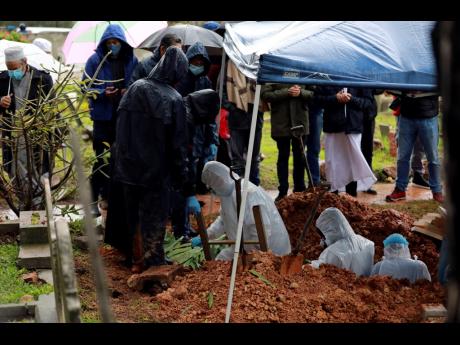South Africa mulls return to restrictions, as COVID-19 surges
(AP): Confronted by surging hospitalisations due to COVID-19, South Africa is considering a return to tighter restrictions to combat the disease, which officials say may soon overwhelm the country's health system.
President Cyril Ramaphosa has announced he will speak to the nation about the crisis this evening, after top health officials have warned of shortages of hospital beds and medical oxygen.
South Africa's rapid increase in reported cases has made it one of the world's centres for COVID-19, as it is ranked as the ninth country most affected by the disease, according to Johns Hopkins University. The country has reported increases of more than 10,000 confirmed cases for several days and the latest daily increase was nearly 13,500. South Africa accounts for 40 per cent of all the confirmed cases in Africa, with 264,184, including 3,971 deaths, according to the Africa Centers for Disease Control and Prevention.
South Africa imposed one of the world's strictest lockdowns in April and May, including closing virtually all mines, factories and businesses, and a ban has been placed on sales of liquor and cigarettes. The measures slowed the spread of the coronavirus, but South Africa's economy, already in recession, contracted dramatically, increasing unemployment to more than 30 per cent and hunger.
In June, the country began relaxing restrictions to allow millions of South Africans to return to work. However, within a few weeks the country's numbers of confirmed cases and hospitalisations increased dramatically.
High concentration in Johannesburg, Pretoria, Cape Town
More than 30 per cent of South Africa’s cases are in the economic hub of Gauteng province, which includes the largest city, Johannesburg, and the capital, Pretoria. The tourist centre of Cape Town also has a high number of cases. Johannesburg’s densely populated Soweto township has a high concentration of cases, according to officials.
In his speech this evening, Ramaphosa is expected to announce whether his government will reimpose some strict lockdown regulations in Gauteng, where officials are concerned that the province's hospitals could soon be overwhelmed. Some top Gauteng officials have urged the government to reinstate restrictions, including limitations on the sale of alcohol and restrictions on movements.
South Africa has carried out 2.1 million tests on its population of 58 million. Because of an international shortage of testing materials, South Africa in June experienced a long delay in the time to get test results, at one point reaching 12 days in government clinics. The situation has improved and the average time to get test results is five days in by public laboratories and two days in private labs, according to the latest figures issued by the National Institute for Communicable Diseases.
Africa’s 54 countries have reported 577,904 cases, according to the Africa Centers for Disease Control and Prevention. The continent’s confirmed cases are concentrated in four countries – South Africa, Egypt with 81,158 cases, Nigeria with 31,987 cases and Algeria with 18,712 cases – which together make up more than 65% of the continent’s cases. The number of actual cases in Africa is believed to be much higher, as the testing rate is very low in many countries.
Follow The Gleaner on Twitter and Instagram @JamaicaGleaner and on Facebook @GleanerJamaica. Send us a message on WhatsApp at 1-876-499-0169 or email us @onlinefeedback@gleanerjm.com or editors@gleanerjm.com.

